Iran......
UK Supreme court quashes Iran bank sanctions and criticises secret hearings
June 20, 2013
Source: Guardian
The government's enthusiasm for secret courts has suffered a setback after the UK's most senior judges quashed an anti-terrorist sanction imposed on an Iranian bank and dismissed the intelligence involved as irrelevant.
In two related judgments, the supreme court ordered the Treasury to remove sanctions against Bank Mellat and said that, in future, appeal courts should go into closed session "only where it has been convincingly demonstrated to be genuinely necessary in the interests of justice".
Read More...
The government's enthusiasm for secret courts has suffered a setback after the UK's most senior judges quashed an anti-terrorist sanction imposed on an Iranian bank and dismissed the intelligence involved as irrelevant.
In two related judgments, the supreme court ordered the Treasury to remove sanctions against Bank Mellat and said that, in future, appeal courts should go into closed session "only where it has been convincingly demonstrated to be genuinely necessary in the interests of justice".
The UK Treasury alleges that the Tehran-based bank financed firms involved in Iran's nuclear weapons programme. Since 2009, the bank has been fighting to have the sanctions lifted.
In order to justify the allegations, the Treasury asked the supreme court to go into a secret session for the first time this spring.Read More...
and....
No cyber attack can hinder Iran's nuclear energy program: Ex-US official

Former head of counterterrorism at the White House Richard Clarke
Thu Jun 20, 2013 5:21PM GMT
8
A former head of counterterrorism at the White House says Iran’s nuclear energy facilities are immune to any cyber attack, also warning against any military strike against the country as “apocalyptic.”
In an interview with the Times of Israel, Richard Clarke - the top counterterrorism advisor to Presidents Bill Clinton and George W. Bush - ruled out the efficacy of a cyber means to stop Iran’s nuclear activities, especially after the failure of the US- and Israeli-developed Stuxnet computer virus against Iran’s nuclear energy program.
“Well, I think we’ve kind of tried that. And by trying Stuxnet when we did and being discovered, I think it’s going to be very difficult to do something like that again. The Iranians are now much more careful, much more observant,” said Clarke.
On June 1, 2012, The New York Times revealed that Stuxnet was part of a wave of sophisticated digital attacks codenamed “Olympic Games,” which US President Barack Obama had ordered against the computer systems that run Iran’s main nuclear enrichment facilities.
The paper also confirmed that the Stuxnet virus was created with the help of a secret Israeli intelligence unit.
Iranian experts, however, detected the worm in time, averting any damage to the country's industrial sites and resources.
Clarke also warned against the “apocalyptic” consequences of a military intervention in Iran, saying that any such measure would involve not only Israel but also the United States.
“I think the Iranian government won’t take it lying down,” Clarke said, adding, “And that could be very, very messy. It could have worldwide economic effects. And I don’t know how it ends.”
Washington and Tel Aviv have repeatedly threatened Tehran with a military strike to force it to halt its nuclear energy program, accusing Tehran of pursuing military objectives in its nuclear activities.
Tehran, however, refutes such allegations as “baseless” and maintains that as a signatory to the Non-Proliferation Treaty and a member of the International Atomic Energy Agency it has every right to develop and acquire nuclear technology for peaceful purposes.
Iranian officials have also promised a crushing response to any military strike against the country, warning that any such measure could result in a war that would spread beyond the Middle East.
MRS/SS/HMV
13 5
Netanyahu pushes EU to mount pressure on Iran

Israeli Prime Minister Benjamin Netanyahu (R) speaks to the press ahead of his meeting with EU Foreign Policy Chief Catherine Ashton at his office in al-Quds (Jerusalem) on June 20, 2013.
Thu Jun 20, 2013 1:11PM GMT
41
Israel is pressing the European Union to take a more aggressive stance on Iran’s nuclear energy program, which Tel Aviv's allies, especially in Washington, have used as a pretext to impose illegal sanctions against Tehran.
"We need to exert pressure on them (Iranians),” Israeli Prime Minister Benjamin Netanyahu said on Thursday during a meeting with EU foreign policy chief, Catherine Ashton.
"It (Iran's nuclear energy program) must stop and I think it is up to Europe to join the United States and Israel … in demanding a halt to Iran's nuclear program," he added.
The remarks by the Israeli premier came a day after his Minister for Military Affairs Moshe Ya’alon called for a “significant increase in pressure by Western countries to lead Iran to the dilemma of either having a bomb or surviving.”
Earlier in the week, the hawkish Israeli premier made a similar call while the rest of the world was amazed by the massive voter turnout in Iran’s presidential election on June 14. The world must not "be tempted to ease pressure on Iran," he urged.
In his first press conference on Wednesday, Iranian President-elect Hassan Rohani said “Iran’s nuclear [energy] programs are completely transparent,” but it is “ready to show more transparency and make clear for the whole world that the measures taken by the Islamic Republic of Iran are completely within international frameworks.”
At a meeting with German Foreign Minister Guido Westerwelle in May, Israeli President Shimon Peres said no “compromise” should be made with Iran in the course of the negotiations between Tehran and the P5+1 group of world powers -- namely the US, Britain, Russia, France, and China plus Germany.
International Atomic Energy Agency (IAEA) Director General Yukiya Amano said on Monday that the sanctions have not had “any impact” on Iran's nuclear energy program, which, he added, is making “steady progress.”
At the beginning of 2012, the US and the European Union imposed new sanctions on Iran’s oil and financial sectors with the goal of preventing other countries from purchasing Iranian oil and conducting transactions with the Central Bank of Iran.
On October 15, 2012, the EU foreign ministers reached an agreement on another round of sanctions against Iran.
The illegal US-engineered sanctions were imposed based on the unfounded accusation by Israel and its allies that Iran is pursuing non-civilian objectives in its nuclear energy program.
Tehran strongly rejects the allegation over its nuclear energy activities, maintaining that as a committed signatory to the nuclear Non-Proliferation Treaty (NPT) and a member of the IAEA, it has the right to use nuclear technology for peaceful purposes.
This is while Israel, which is widely known to be the only possessor of nuclear weapons in the Middle East with up to 400 nuclear warheads, has not signed the NPT whose ultimate objective is the total disarmament of nuclear weapons.
MRS/MA/SS/HMV
Turkey......
http://english.pravda.ru/world/asia/20-06-2013/124888-turkey_collapse-0/
Turkey doomed to collapse?
Brazil .......
Brazil Protests Return With A Vengeance: Up To A Million Take To The Streets
Submitted by Tyler Durden on 06/20/2013 20:14 -0400
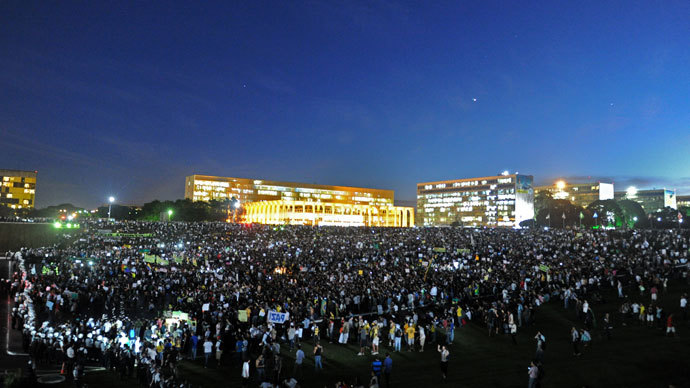
Currently going on in Rio: three hundred thousand (expected to rise to a million) have taken to the streets in Rio in the biggest protests so far sweeping Brazil:
If the Brazilian government thought that caving yesterday to popular demands against a $0.10 bus and subway fare hike would be enough to placate the millions and see a peaceful dissolution to the protests that had gripped the country in the past two weeks, it found out in less than 24 hours that ceding to the angry mob only emboldens the public to demand more (and with a list a grievances including corruption, violence, police repression and failed politicians the list of demands is sure to escalate). Sure enough, the very next day, the public emerged with newfound energy and momentum, as 300,000 people took to the streets of Rio de Janeiro and hundreds of thousands more flooded other cities in the largest protests yet.
Undeterred by the reversal of transport fare hikes that sparked the protests, and promises of better public services, marchers demonstrated around two international soccer matches and in locales as diverse as the Amazon capital of Manaus and the prosperous southern city of Florianopolis."Twenty cents was just the start," read signs held by many converging along the Avenida Paulista, the broad avenue in central Sao Paulo, referring to the bus fare reductions.In the capital, Brasilia, tens of thousands of protesters by early evening marched around the landmark modernist buildings that house Congress, the Supreme Court and presidential offices.The swelling tide of protests prompted President Dilma Rousseff to cancel a trip next week to Japan, her office said.The targets of the protests, now in their second week, have broadened to include high taxes, inflation, corruption and poor public services ranging from hospitals and schools to roads and police forces.With an international soccer tournament as a backdrop, demonstrators are also denouncing the more than $26 billion of public money that will be spent on the 2014 World Cup and 2016 Olympics, two events meant to showcase a modern, developed Brazil. After the concession on transport fares on Wednesday, activist groups differed over what their next priority should be. But the competing demands of demonstrators appeared to add to the intensity of Thursday's protests.
Is a political crisis next?
The protests have shaken the once solid ground under Rousseff and her ruling Workers' Party, a bloc that itself grew out of convulsive demonstrations by Brazil's labor movement 30 years ago. Until inflation and other economic woes began eroding her poll numbers in recent weeks, Rousseff enjoyed some of the highest approval ratings of any elected leader worldwide.The demonstrations have been largely non-violent and comprised mostly middle-class, well-educated voters who do not form the bulk of Rousseff's electoral base.But she and her party have sought to get ahead of the complaints and embrace them as their own - a shift that contrasts sharply with a playbook that long relied on telling Brazilians that they had never had it so good. With little more than a year to go before presidential and gubernatorial elections, the unrest is forcing incumbents and traditional political parties to reconsider their strategies.The decision to cut transportation fares illustrates what many analysts consider a reactive and contradictory response by a ruling class caught off guard."Were they wrong before or are they wrong now?" asked Carlos Melo, a political scientist at Insper, a business school in Sao Paulo, noting what had been a steadfast refusal to reverse a fare hike.
And hence the game theory response to popular unrest: yield to it, and it only demands more. Fight it, and generate even more animosity. Lose - lose, as Brazil is about to learn the hard way. The bigger problem, however, is that Brazil is merely the latest country in what is rapidly becoming the sequel to the Arab spring of 2011 - the Global Summer of 2013, which has so far seen protests in Greece, Turkey, Spain, Brazil, and Indonesia just to start, and all of it driven by that segment long-forgotten in a world hell bent on generating a wealth effect for those already wealthy: the youth, which has rarely had it as bad as it does now.
Going back to Brazil, here are some recent snapshots of what is going on tonight, courtesy of RT:
23:13 GMT: Riot police in the capital Brasilia have prevented a group of protesters from breaking through the police cordon towards the Congress.

22:45 GMT: Police fired large rounds of tear gas against protesters in the city of Campinas in Sao Paulo state in a confrontation adjacent to government buildings.
A Globo TV correspondent reported a tense situation as demonstrators faced off against riot gear-clad officer 22:23 GMT:
22:03 GMT: Police in Rio de Janeiro have already resorted to tear gas early Thursday evening to disperse a crowd making its way to city hall. Plumes of smoke could be seen on video broadcast by local TV.
Authorities in Brazil's cultural capital expect as many as a million protesters to converge on the city, despite recent announcements by state governments to scrap plans to increase public transportation costs. Protesters intended to march on Maracana Stadium just as a Confederations cup football game was to kick off.
21:32 GMT: A huge demonstration is currently taking place in the Candelaria neighborhood of downtown Rio de Janeiro. At least 300,000 people have marched towards town hall, according to estimates by the police, who expect as many as a million protesters to gather later in the day.
19:36 GMT: Rio de Janeiro authorities have ramped up police strength with an estimated 8,000 officers to be deployed to handle the demonstration the city’s center and security for the Spanish and Tahiti football teams. Some 1,200 riot police, armed with teargas and rubber bullets, will remain in barracks unless the protest turns violent. The increase comes after the authorities admitted they underestimated the scale of Monday's march, when only 150 officers were on duty to withstand a crowd of more than 100,000.
15:00 GMT: Leaders in two of Brazil's largest cities reversed hikes in bus and subway fares that fueled the protests. Sao Paulo and Rio de Janeiro both stepped down. "This will represent a big sacrifice and we will have to reduce investments in other areas," said the Mayor of Sao Paulo, Mayor Fernando Haddad.
http://rt.com/news/brazil-protests-transport-unrest-871/
Brazil rage spills onto the streets: LIVE UPDATES
Published time: June 18, 2013 23:08
Edited time: June 20, 2013 22:58
Edited time: June 20, 2013 22:58
Brazil has entered a second week of mass protests, with hundreds of thousands turning out in Sao Paulo, Rio de Janeiro, Belo Horizonte, Brasilia and elsewhere. Unrest left at least 100 injured and resulted in over 250 arrests on Monday.
22:45 GMT: Police fired large rounds of tear gas against protesters in the city of Campinas in Sao Paulo state in a confrontation adjacent to government buildings.
A Globo TV correspondent reported a tense situation as demonstrators faced off against riot gear-clad officers.
A Globo TV correspondent reported a tense situation as demonstrators faced off against riot gear-clad officers.
02:50 GMT: Sao Paulo continued to be the focal point of protests on Tuesday night, with smaller demonstrations seen in the thousands in Rio de Janeiro as well as Belo Horizonte and smaller cities around the country.
In the country’s largest city there were reports of looting and vandalism inflicted on several bank branches. Local media meanwhile had sporadic reports of individuals in Sao Paulo hauling electronics and home appliances out of shattered store fronts, as well as stealing watches, jewelry and mobile phones.
Aside from a tense moment when demonstrators attempted to breach city hall, however, the situation seemed more subdued than the day prior. Some fifty individuals were reportedly arrested in that city while police continued to comb through downtown.
In the country’s largest city there were reports of looting and vandalism inflicted on several bank branches. Local media meanwhile had sporadic reports of individuals in Sao Paulo hauling electronics and home appliances out of shattered store fronts, as well as stealing watches, jewelry and mobile phones.
Aside from a tense moment when demonstrators attempted to breach city hall, however, the situation seemed more subdued than the day prior. Some fifty individuals were reportedly arrested in that city while police continued to comb through downtown.
01:30 GMT: Police are attempting to disperse tens of thousands of protesters converged on Avenida Paulista, the main drag in Sao Paulo, using tear gas.
In Rio, 7,500 members of the armed forces are on standby to be deployed if the protests cannot be contained.
In Rio, 7,500 members of the armed forces are on standby to be deployed if the protests cannot be contained.
and.....
http://www.blacklistednews.com/Bracing_for_Mass_Rally_Brazil_Deploys_Spy_Planes%2C_Thousands_of_Police/26816/0/38/38/Y/M.html
Bracing for Mass Rally Brazil Deploys Spy Planes, Thousands of Police
June 20, 2013
Source: Common Dreams
Officials from Rio de Janeiro flex surveillance might ahead of, what is expected to be, largest demonstration yet.
Brazilians hold a poster shaped as a bus that reads in Portuguese; "Zero tariffs, transport 24 hours," during a march in Brasilia, Brazil, Wednesday, June 19, 2013. (Photo: Eraldo Peres/ AP)Brazilian authorities are ramping up in anticipation of the largest round of demonstrations yet Thursday evening with the deployment of thousands of additional armed officers and a high-tech police surveillance system that would make the United States National Security Administration proud.
Organizers expect the turnout for Thursday's march to be the largest yet, even surpassing the quarter of million people who protested Monday evening in cities across the country including over 100,000 people in Rio de Janeiro.
According to the Associated Press, protests are planned in over 80 cities nationwide with the largest crowds expected in Rio de Janeiro where protesters say they'll march on Maracana stadium "just as a Confederations cup soccer game is getting under way."
In anticipation of the crowds, authorities have reportedly deployed thousands of additional police personnel to Rio including a "battalion" of armed riot police.
The Guardian reports:
The military police spokesman for Rio state, Frederico Caldas, estimates that 8,000 police will be involved in a dual operation to handle the demonstration in the center of the city and security for the Spanish and Tahiti football teams to and from the Maracanã stadium – which is also expected to attract protesters.The Guardian adds that Thursday's demonstration will be the first opportunity the Rio police force will be able to flex their surveillance might with their recently inaugurated "high-tech police command center," which includes a "giant screen with images from hundreds of cameras around the city," to be aided by helicopters with "high-resolution imaging" to monitor the crowd. Ahead of the demonstration, police have also reportedly been monitoring social media sites "to anticipate plans for gatherings."
The number includes 1,200 riot police who will remain in barracks unless the demonstration turns violent. They will be armed with teargas and rubber bullets, but the authorities say they will only be used in extreme cases.
The fierce police crackdown witnessed in response to the largely peaceful demonstrations has spurred international attention and support to the nationwide protest.
In a gesture to curb the growing wave of anger, government officials in at least five major Brazilian cities announced Wednesday evening the reduction in public transportation fares—an issue which provided the initial spark for the resistance movement.
Following the news, there is little sign that the protests will ease up.
A statement issued by the protest group Free Fare Movement said the struggle "neither begins nor ends today." They credit the government's submission to the "blocked streets, barricades, and civil unrest" and vow to continue to fight until they achieve "a public transport without any charge, where decisions are taken by the users and not by politicians and businessmen."
Though initiated by unrest over the fare increase, the protests have spiraled into a larger demonstration against political corruption and the prioritization of tourism and international events such as the upcoming World Cup and Olympic games over basic civic commodities.
"It's not really about the price anymore," said Camila Sena, an 18-year-old student who marched Wednesday in Rio de Janeiro's sister city of Niteroi. "People are so disgusted with the system, so fed up that now we're demanding change."
"We are against a government that spends billions in stadiums while people are suffering across the country," added student Natalia Querino. "We want better education, more security and a better health system."
This video by Brazil's Folha de Sao Paulo gives a reporter's account of being shot in the face with a rubber bullet while covering the protests. (By turning on Closed Caption you can watch with English subtitles.)













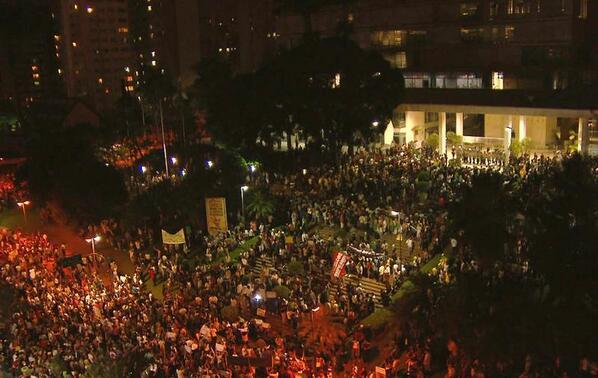

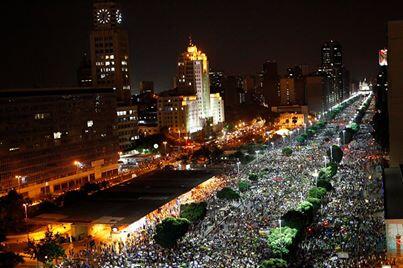

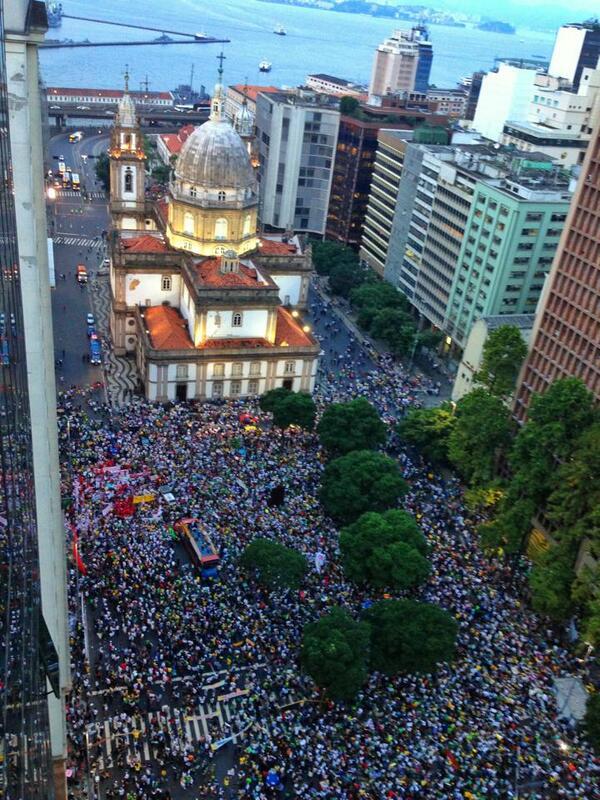

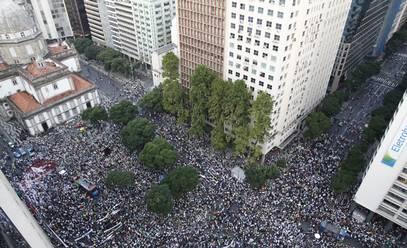


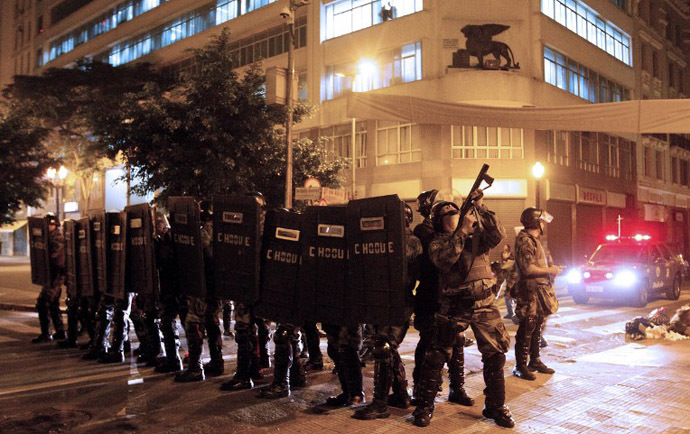
No comments:
Post a Comment